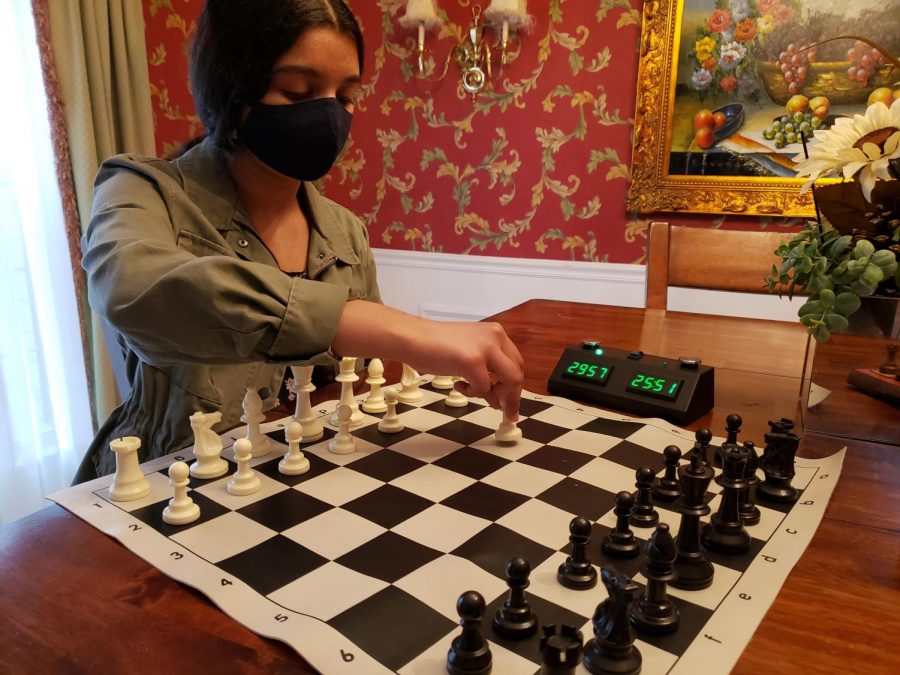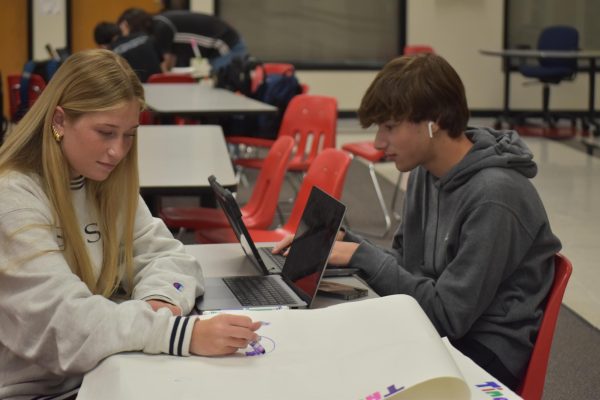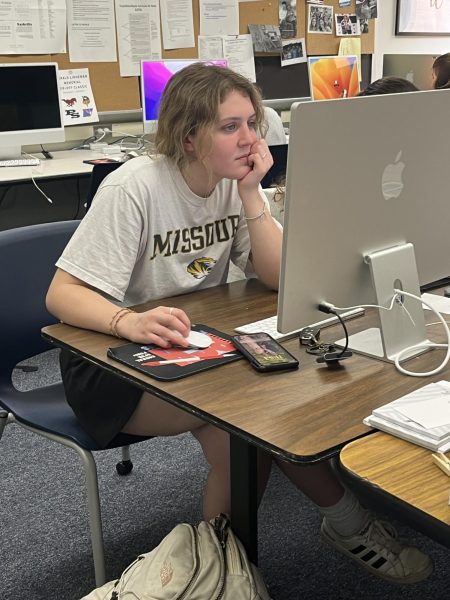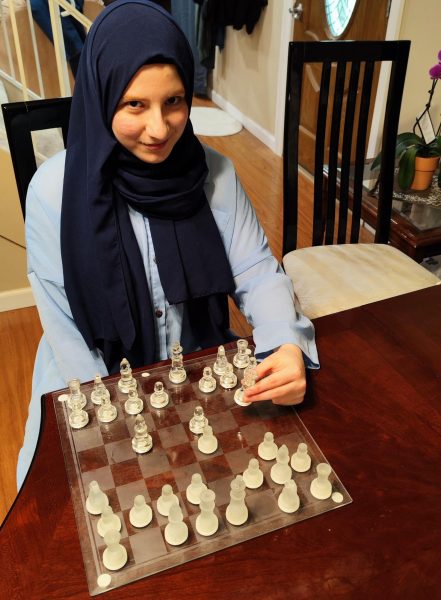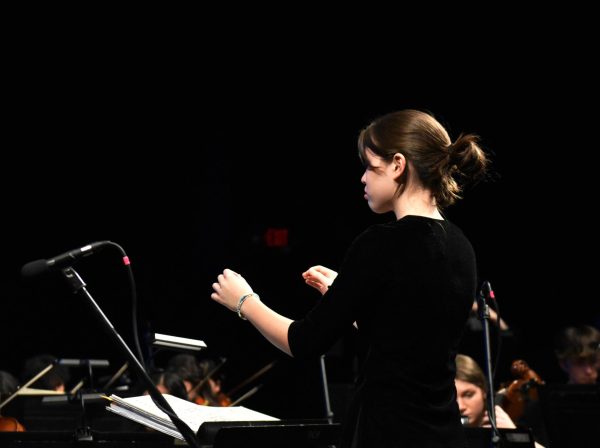A Queen in a Game of Kings
Gaayathri Binoj plays chess to unlock her confrontational side
Binoj values chess as an everyday hobby. “Every loss is just another way to learn something about how to improve,” Binoj said. “I think that’s the biggest thing you can learn from playing games.” Photo by Emma Li.
February 23, 2021
Soft spoken and kind, sophomore Gaayathri Binoj, Gaaya to most, is a person who can get along with anyone, and sees the good in everyone. But even a warmhearted person can find a way to open their combative side.
Binoj has been playing chess competitively for four years now, which is late in the world of chess, where students usually begin around the age of seven or eight. She began by taking classes at a Hindu temple with her friend in middle school, and her interest has not waned since.
“My progress in the beginning was really slow, but I loved the adrenaline of a chess game,” Binoj said. “Even though the games are quite long, your emotions really go up and down because any move you make can change the outcome of the game.”
Chess first emerged around 1500 years ago, and continues to hold people’s attention today, with about 605 million adults in the world who regularly play chess. The origins of the game are highly debated, though it is widely acknowledged that a group of people worked together to create the game, which spread from North India, to Persia, then to the rest of Asia, and eventually the entire world.
However, a famous legend tells of a king who orders a wise man to create a game that mimics life, where each piece has its own rules on how it can move, and is made up of sacrifices, large and small. Although the story with the king may only be a legend, it does represent a goal of common purpose, which may be why so many people are still drawn to the game to this day. It has helped people to learn strategies that can be taken off the board and into daily life, even in a modern world.
“I used to be a passive player,” Binoj said. “I hated attacking people in chess because that was just my personality. But in chess you’re forced to take those risky, aggressive moves, you’re forced to gambit your pieces, and in daily life it makes you more receptive to taking risks that might come with good rewards.”
Chess is known for being complicated, with lots of rules. But sometimes, straying off the beaten path is better.
“I like chess because even if you’re in the worst position, the hardest situation, there’s always a way you can find to get yourself out,” Binoj said. “Just two weeks ago, I was in a tournament and I was in a bad endgame position, and if I had kept playing normally, I definitely would have lost. But there’s a trick where I sacrificed all of my pieces, and my opponent had to checkmate me with a knight and a bishop. It’s known as the bishop and knight checkmate and it’s one of the hardest. So, he couldn’t do that because most people can’t, so it ended up being a drawn game.”
During chess tournaments, players take notation, which records the moves made or location of the pieces, depending on the style of notation. It is crucial for players to make these notes, so they can learn from their mistakes.
“I’ve had three chess teachers, and the most impactful one was Candidate Master Chris Land,” Binoj said. “He used to teach in Houston every Wednesday, we’d go to a Taco Bell and he’d play over my games. I never took good notation, but he helped me learn how to take good notation and get better from that.”
A Candidate Master is a title granted by the FIDE, the World Chess Federation, to anyone with a rating of 2200 or higher. Ratings are given to competitive players of a variety of experiences. Beginners usually start at around 1200, and international professional players can achieve a ranking of 2500 or higher. Binoj is currently at a rating of 1640, which is consistently above average, though it changes due to performance, and is not the highest she has achieved.
“The last few years have been hard for me in chess,” Binoj said. “I didn’t improve as fast as I was improving before, so that was definitely disappointing. After I moved to St. Louis [three years ago], I lost, like, 100 rating points. I lost motivation as well, because I thought I was getting worse instead of improving.”
Sudha Somarajan is Binoj’s mother, and a steady support. Binoj recalls her mother driving her to distant tournaments, as far away as a two hour drive. But that is not the only support she gives.
“I don’t have any knowledge in chess, so I don’t give any advice specific to chess,” Somarajan said. “My main role is that whenever she goes to a tournament, and she’s not feeling confident, I try to encourage her. I tell her it doesn’t matter if you lose or not, but try to play your best. Don’t think about your opponents. Just try to do your best.”
In the past year, opponents have become easier to overlook, as chess tournaments have moved online along with nearly everything else, often making it more lonely in the individual sport.
“Going online has changed a lot about chess tournaments,” Binoj said. “It’s usually not as fun, because for in-person tournaments you talk to your opponent after the game, you learn about their ideas behind the moves. Online, you sometimes have to have two cameras to make sure you’re not cheating, and they put it through cheat detection software.”
Beyond the isolation of playing online, few of the people behind those screens are women. Grandmaster Hou Yifan is the only woman on the list of the top 100 players in the world as of December 2020, and there has never been a female world champion.
Although there is no scientific evidence that male or female minds are better suited to chess, there is still a large gender gap in chess players. On the FIDE rating list in 2019, only 10.1% of players were women, and women in the chess world are consistently subjected to misogynistic comments.
Grandmaster Jennifer Shahade even created an enlarged chessboard filled with insults she and other female players had endured, entitled Not Particularly Beautiful. Binoj has had experience being excluded as a female chess player as well.
“Gender has a big impact on chess,” Binoj said. “It’s the culture of chess as well, because after your games, there’s like twenty minutes in between each round and all the boys would play blitz games together, and banter, and have all this fun, and you just kind of feel a little left out.”
However, organizations such as the St. Louis Chess Club are taking steps to encourage women to pursue chess, such as offering online beginner classes for women on platforms such as Twitch, and hosting the Cairns Cup, a tournament for the top women in the world. In the summer of 2020, Binoj participated in an all-girls youth tournament named after Ruth Haring, an international chess master who competed in the United States Women’s Championship in the 1970s and 80s, represented the U.S. in multiple Chess Olympiads, and was elected to the U.S. Chess Federation Executive Board in 2009.
“This summer I got to play at the Ruth Haring National Tournament of Girl State Champions,” Binoj said. “It was virtual, but I was very proud that I got to play for Missouri at that tournament. This year it was based on rating, so they sent one girl per state. I didn’t do particularly well at the tournament, but it was a great experience to play in a tournament that was just full of girls. Usually, I don’t get to play a single girl at most tournaments because the participation rates are so low, so it’s special to play with people like me.”
It’s often frustrating to beginner players when the pieces have rules and limitations on where and how they move. In fact, the earliest versions of chess were much more limited in movement, including the queen, the weakest piece at the time, because it could only move one square at a time in a diagonal direction. Now, it can move forwards, backwards, and diagonally, at a distance only limited by pieces in the way.
“I like the queen, because she’s the strongest piece on the board,” Binoj said. “She’s stronger than the king, stronger than everyone else. And, the whole point of pawns is that when they get to the end of the board they can become any piece they want, and usually they become queens because those are the strongest.”
Binoj has won multiple awards for her efforts, though she modestly insists that they are from years past. The most valuable prize is the game itself.
“I would love to encourage other people to play, cause even if you don’t want to play competitively in tournaments, even playing online can change your life,” Binoj said. “It’s not just a game that teaches you lessons, it’s just a good pastime, a hobby, and it’s a way that a lot of people can connect, because it’s the game of kings and the king of games.”



